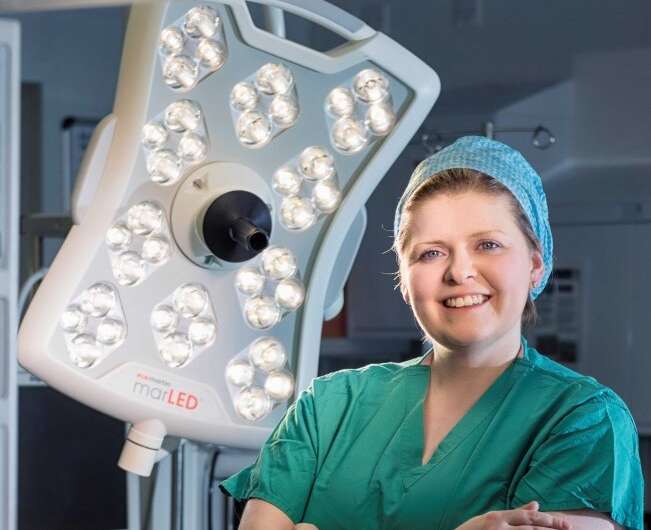Dr Andrea Woolner from the University of Aberdeen led the study. Credit: University of Aberdeen
Women are no more likely to have a stillbirth just because their mother may have had one, according to new research from the University of Aberdeen.
The study, which is the first ever to look at inherited predisposition to stillbirth between mothers and daughters, examined data from more than 26,000 pairs of mothers and daughters.
Previous evidence has suggested that placental dysfunction, which includes preeclampsia is inherited from mother to daughter.
The researchers found 384 daughters had a history of one or more stillbirth, with 26,404 having only live births.
The study found no statistically significant association between mothers' history of stillbirth or miscarriage and stillbirth in daughters.
The research has been published in the American Journal of Obstetrics and Gynecology.
In the United States, 23,000 babies were stillborn in 2013 (5.96 per 1000 total births). In 2015, the stillbirth rate per 1000 total births was 4.5 in England and Wales and 18.4 per 1000 worldwide.
Although several risk factors have been identified as being responsible, many cases of stillbirth remain unexplained.
The data studied came from the Aberdeen Maternity and Neonatal Databank, a population-based database that holds routinely collected obstetric and fertility related data from 1949 to current day for all deliveries and reproductive outcomes from Aberdeen maternity hospital.
Dr. Andrea Woolner, a clinical lecturer from the University of Aberdeen who led the study, said: "The objective of this study was to determine whether a history of stillbirth in mothers is associated with an increased risk of stillbirth in daughters.
"Using the fantastic resource that is the Aberdeen Maternity and Neonatal Databank we were able to analyse a large number of women and daughter pairs and their birth outcomes.
"From our analyses, there does not appear to be an increased risk of stillbirth in daughters whose mothers had a history of stillbirth or miscarriage. To our knowledge, this is the first observational study to investigate stillbirth risk transmitted from mother to daughter.
"Stillbirth and miscarriage are obviously devastating for the parents and whilst many aspects remain unexplained, it is hoped research such as this can help us understand more and feed into supportive advice that can be provided to couples."
More information: Andrea M.F. Woolner et al. Inherited predisposition to stillbirth: an intergenerational analysis of 26,788 mother-daughter pairs, American Journal of Obstetrics and Gynecology (2019). DOI: 10.1016/j.ajog.2019.01.215
Provided by University of Aberdeen
























